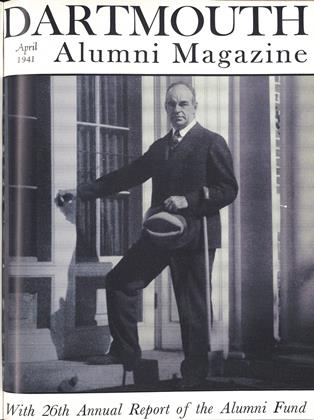EDMUND E. DAY '05 gave the principal address at meetings of the Phi Kappa Society in Philadelphia December 30. Speaking on the title "The Discipline of Free Men," Cornell's President further developed the theme on which he spoke at the Dartmouth Night celebration in Hanover November 14. The following are significant quotations from his address:
"It is as fellow citizens of the world's greatest democracy that I address you today. I take it that you and I are agreed that this country of ours should remain free. The present world situation being what it is, this insistence upon freedom raises farreaching questions of national defense. Part of these questions have to do with our own armed forces at home and abroad and with our possible aid to Britain; part relate to matters of a very different sort: they concern the temper of the American people. It is because I am convinced of the surpassing importance of this phase of the defense program that I speak to you today of the discipline of free men.
"It is high time for America to face squarely the problems of individual and social discipline in a democracy. The fate of nations is in large measure a matter of the disciplines they develop. This is true in periods of peace; it becomes strikingly true in times of international conflict. Right now, America is confronted by hostile nations which have affected disciplines both formidable and threatening. These enemy powers of Europe and Asia view the democratic way of life as soft and spineless. They sneer at our lack of national solidarity. They charge us with being disillusioned and disorganized, sickly if not crippled, weak and vulnerable. They assert that our very ideals of freedom and loyalty are incompatible. They threaten us with the conquest which they have already visited upon other democratic peoples."
"In striking contrast is the other form of social discipline—the discipline of the free or democratic society. Its foundations lie deep in human hope and aspiration. It builds not in fear of suffering and misfortune, but in the promise of greater happiness and freedom. The values toward which it endeavors to direct the larger powers which flow from social discipline are the values which reside in a broad and expanding humanitarianism. It finds no place for treachery and cynicism. It knows and respects the record of the age-long struggle through which men and womena host of them Americans—have gained such freedom as we have. It believes in peace. It has a great and enduring faith in mankind. It is a discipline that is responsible and self-imposed. It is the discipline of free men. It is the discipline of the democratic peoples of the world now and in all time to come."
"Organizing for the attainment of a more effective social discipline is one of the most pressing problems now confronting the American people. In part it is a matter of formal education. Our schools and colleges must be made to contribute more than they do to the necessary disciplines of our democratic way of life. In part it is a matter of adult education through all the available media of communication. Every citizen should come to know and be led to practice the disciplines which must prevail if America is to remain free. In part it is a matter of moral leadership. America craves the leadership of those who understand and in high office exemplify the democratic way of life. As a people we must be led to see first things first. We must moderate our materialism and love of money. We must abandon our worship of personal power. We must redefine success in terms of service to one's fellow men. We must put the full force of public approbation and social prestige behind the contributions which fortify a just and progressive free society. We must improve our organization for dealing promptly and justly and at the same time effectively with the undisciplined. We must increase opportunities for purposeful activity. We must give meaning to life even for the most humble and inexperienced. We must strive with all the devotion we can muster to achieve the discipline of free men. This is no mere pious moralizing or wishful thinking: it is necessary action and hence practical politics, if America along with the rest of the world is not to fall back into another Dark Age. In the discipline of free men lies the only hope of mankind, and on that same discipline depends now and for generations to come the very existence of the free America for which our fathers fought and died."
 View Full Issue
View Full Issue
More From This Issue
-
 Feature
FeatureReport of Twenty-Sixth Alumni Fund
April 1941 By SUMNER B. EMERSON '17 -
 Feature
FeatureContributions by Classes in 1940 Alumni Fund Campaign
April 1941 -
 Feature
FeatureThayer School Report
April 1941 By F. H. Munkelt '08 (Thayer '09) -
 Feature
FeatureClass Rankings on 1940 Achievement
April 1941 -
 Feature
FeatureDartmouth Regulars
April 1941 -
 Feature
FeatureAlumni Fund Records 1915 to 1940
April 1941








